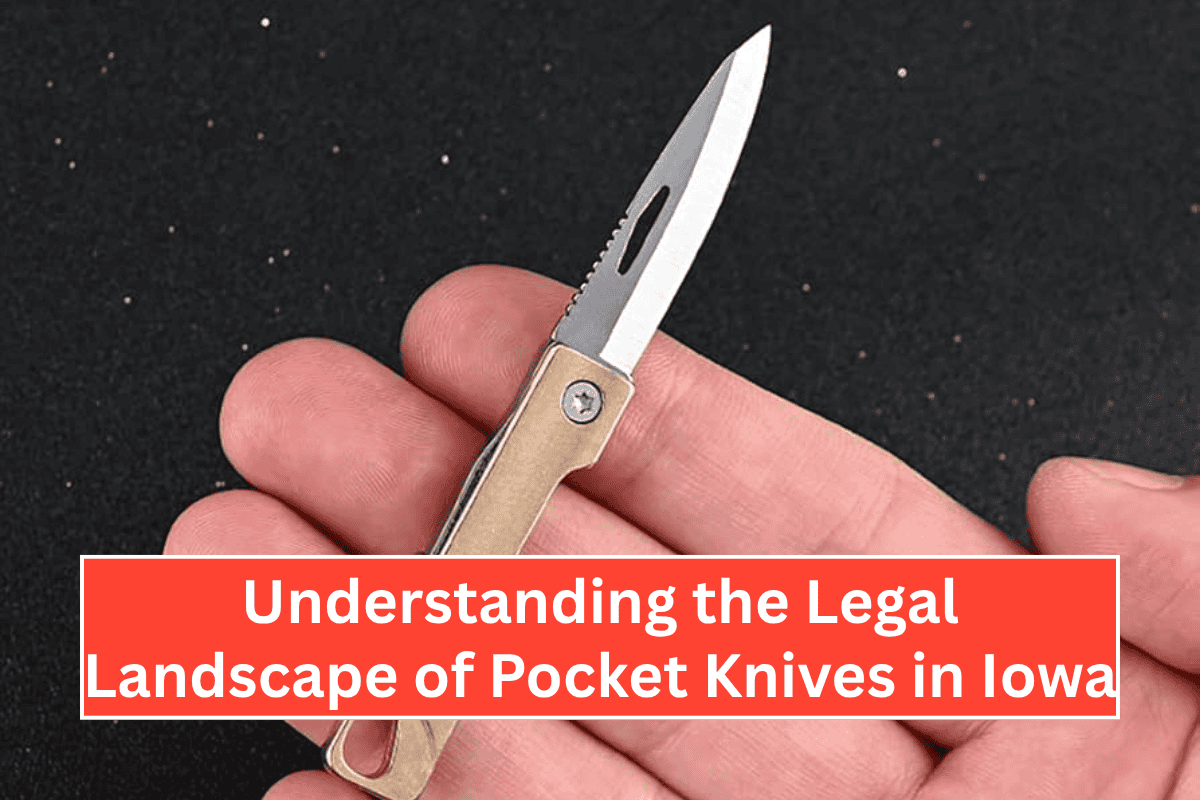When it comes to carrying knives in Iowa, it’s crucial to understand the state’s legal framework. Whether you’re a knife enthusiast or simply need a tool for everyday use, knowing the rules surrounding knife ownership and carrying can help you avoid legal trouble.
Iowa law is specific about which knives are legal to own and how they can be carried. Let’s break down the key regulations regarding pocket knives in Iowa.
Legal Types of Knives in Iowa
Under Iowa law, several types of knives are legal to own. These include:
- Switchblades and automatic knives
- Balisong or butterfly knives
- Dirks, daggers, stilettos, and other stabbing knives
- Large knives, including Bowie knives
- Disguised knives, such as belt knives, cane knives, and lipstick knives
These knives can generally be owned without issue. However, the law places restrictions on how certain knives can be carried, particularly when concealed. Knowing the boundaries can help you avoid charges related to illegal weapon possession.
Carrying Knives: Open vs. Concealed Carry
While owning these knives is legal, how you carry them is a different story. In most cases, it’s legal to openly carry any knife. However, the rules are stricter when it comes to concealed carry. In Iowa:
- It is illegal to carry a knife with a blade longer than 5 inches if it’s concealed.
- Carrying certain knives, such as switchblades, daggers, stilettos, and balisong knives concealed is prohibited.
- Disguised knives, including cane swords and lipstick knives, also cannot be concealed.
Concealed carry violations can lead to serious consequences, including criminal charges.
Special Case: Ballistic Knives
Ballistic knives, which have a detachable blade that is propelled by a spring, elastic material, or compressed gas, are generally illegal to possess in Iowa. These knives are considered dangerous weapons due to their ability to shoot the blade, and possession can result in criminal charges.
Penalties for Carrying Concealed Knives
Iowa law carries severe penalties for carrying a concealed knife, depending on the blade’s length:
- If the concealed knife has a blade longer than 8 inches, the crime is considered an aggravated misdemeanor, punishable by up to two years in prison or up to one year in jail along with a fine ranging from $625 to $6,250.
- If the blade exceeds 5 inches but doesn’t exceed 8 inches, the crime is a serious misdemeanor, punishable by up to one year in jail and a fine between $315 to $1,875.
These penalties make it clear that the law treats knife-related crimes seriously.
What Is Considered a “Dangerous Weapon”?
Iowa law defines a dangerous weapon under Iowa Code Section 702.7 as any device designed to inflict harm, such as a knife with a blade longer than 5 inches or a switchblade.
A weapon becomes categorized as dangerous when it is used with the intent to cause serious injury or death. This includes firearms, razors, and even a knife when used for the purpose of committing a crime.
Defenses to Carrying a Concealed Knife or Weapon
Iowa law provides several defenses to charges related to carrying a concealed knife or weapon, including:
- Ownership of the weapon within your dwelling or land.
- Being a law enforcement officer, correctional officer, or military personnel.
- Engaging in lawful activities such as hunting or target practice.
- Having a valid permit to carry weapons.
These defenses can help individuals avoid criminal charges if they meet the legal criteria.
Bringing Knives to Airports
One of the most common areas where people face charges for carrying knives is at airport security. It’s illegal to carry concealed or open knives into restricted areas, such as the security checkpoint at airports. Even if you unintentionally bring a knife into the airport, you may still face criminal charges.
At Des Moines International Airport, for example, authorities regularly deal with individuals who attempt to bring prohibited items, such as knives, through security. If caught, the Transportation Security Administration (TSA) may call local police to investigate, and you could face criminal charges and civil penalties.
TSA imposes a civil penalty of up to $11,000 for bringing prohibited weapons like knives through security. Penalties for firearms vary, with the average fine for a loaded firearm being $3,000.
Navigating the laws around pocket knives in Iowa is important to avoid legal issues. While owning a variety of knives is legal, it’s crucial to understand how you’re allowed to carry them, particularly regarding concealed carry.
Always be mindful of local regulations, especially when traveling, and ensure that knives are carried in compliance with state laws. If you’re unsure about the legality of carrying a particular knife, seeking legal advice can prevent costly legal consequences.












